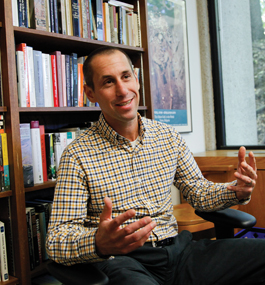Sweetening the Pod: Literary Talk Goes Digital

Photo by Mike Lovett
by by Susan Piland
Forget the eggheady, dry-as-dust stereotypes about literary studies. To paraphrase novelist Margaret Atwood, the insights you get from literature are only as good as the questions you ask.
The key, therefore: Ask good questions. Take a page from David Sherman, assistant professor of English at Brandeis, who persuades literature experts to riff on offbeat, interesting research topics: How is the 19th-century novel“Middlemarch” like the old “Oprah” daytime TVshow? (Answer: George Eliot, as much as Oprah, gave her audience members detailed instructions on how to live their best life spiritually, socially, intellectually.) What did the Victorians do with books, besides read them? (Since paper was still expensive, reading was just stage one of a book’s life cycle; ultimately, the torn-out pages might be used to wrap fish.) Why are our lives improved when we thrill to the chills that fill gothic novels? (At their core, gothic stories are myths, exploring contradictions that can’t be fully explained, such as the fact that all living creatures invariably die.)
And, in a cool synthesis of message and medium, the offbeat, interesting answers Sherman elicits are as close at hand as your iTunes account. Since April, Sherman has been posting episodes of a podcast called Literature Lab, which, he says, encourages “literature professors to talk about their research and teaching interests in a way that’s accessible to anybody.”
With an audio-friendly manner that telegraphs warmth, intelligence and a sense of fun, Sherman does one-on-one interviews with literary scholars throughout the Boston area on a variety of topics — from medieval dream visions, to poet Ezra Pound, to 9/11 literature. Interviewees so far have included Lisa Rodensky, of Wellesley College; Leah Price, of Harvard University; and John Paul Riquelme, of Boston University.
“I stole the idea from the Philosophy Bites podcast,” says Sherman, “a hugely successful enterprise with millions of downloads that publicizes the work that philosophers do. We didn’t have anything like that for literary studies. A lot of people enjoy literature, but they don’t know what scholars like us do. My idea was to be more public, so we’re not just talking to ourselves.”
He recruits his interviewees after researching who is doing especially thought-provoking work, often by checking out faculty websites. “I will be doing more Brandeis people this year,” he says. “I didn’t want to start with Brandeis faculty because I didn’t want the podcast to seem too in-house.”
Sherman does all his interviews in person, using a portable digital recorder, capturing at least an hour of material, which gets edited down to a final version that’s 30-45 minutes long. The work is sponsored by a grant from Brandeis’ Theodore and Jane Norman Fund, which supports faculty research and creative projects in the arts and sciences. Sherman plans to add one or two episodes to the podcast playlist each month.

Photo by Mike Lovett
page 2 of 2
Since April, the eight episodes currently available have attracted nearly 3,000 hits. Sherman’s listeners are far-flung. “Our audience is strangely international,” he says. “We get a lot of U.S. hits but also hits from the U.K., Taiwan, Spain, Australia, Croatia.”
Asked to select his favorite installment so far, Sherman points to an episode titled “Convicted Reading,” about an alternative-sentencing program that requires criminal offenders to take a literature class during their probation, under the assumption that engaging with literature can fundamentally change the way people see themselves and the possibilities of their lives. “It’s a very human-level story,” Sherman says. “A dramatic story.”
Books on the sentencing program’s syllabus might include “Of Mice and Men,” “The Sea-Wolf” and “One Flew Over the Cuckoo’s Nest,” novels that address searches for individual identity and freedom, and struggles with authority figures. A former addict who read “The Old Man and the Sea” reported he heard Santiago’s voice in his head when he was tempted to use again; just remembering how Santiago, in the midst of his pain, found the courage to go fishing day after day gave the man courage to stay clean another 24 hours. The fictional voice was only a catalyst, the program founder notes in the podcast; what the former addict was hearing was, in fact, the depth of his own voice.
“I really believe in the work we do,” Sherman says of the literary studies field. “We make it more interesting to read a wonderful novel, or play, or poem. A critical response to literature is part of a passion for literature.”
Sherman’s own research focuses on early 20th-century English and American literature. He’s currently putting the finishing touches on a book about modernist writers' responses to changes in funeral and burial rituals, looking at evidence in the work of Wilfred Owen, William Faulkner, Virginia Woolf and James Joyce, among others.
Come spring, Sherman will teach a course called “Literature and Medicine,” which investigates how great works of fiction approach illness, healing and the doctor-patient relationship. The class, he says, grows from an emerging discipline called the medical humanities, which helps medical personnel in training become more sensitive caregivers.
Great literature, says Sherman, has the power to nudge readers into transforming their lives. It all depends on the questions you ask — and on the transparency of the answers. That’s why, he says, scholars have a responsibility “to make even the most complicated research topics clear to anyone who’s interested.”
To listen to Sherman’s podcasts, search on “Literature Lab” in the iTunes store, or go to the the English Department Website at Brandeis Unversity.
